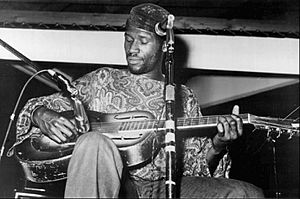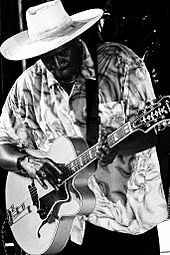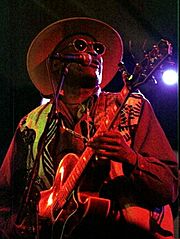Taj Mahal (musician) facts for kids
Quick facts for kids
Taj Mahal
|
|
|---|---|

Mahal in 2005
|
|
| Born |
Henry St. Claire Fredericks Jr.
May 17, 1942 New York City, U.S.
|
| Spouse(s) |
|
| Relatives |
|
| Musical career | |
| Genres | |
| Occupation(s) |
|
| Instruments |
|
| Years active | 1964–present |
| Labels |
|
Henry St. Claire Fredericks Jr. (born May 17, 1942), known as Taj Mahal, is an American blues musician. He plays many instruments, like the guitar, piano, banjo, and harmonica. He often mixes sounds from different parts of the world into his music. For over 50 years, Taj Mahal has changed what blues music can be. He blends it with styles from the Caribbean, Africa, India, Hawaii, and the South Pacific.
Contents
Early Life and Musical Beginnings
Taj Mahal was born Henry St. Claire Fredericks Jr. on May 17, 1942, in New York City. He grew up in Springfield, Massachusetts. His family loved music: his mother sang in a gospel choir, and his father was a jazz musician from the Caribbean.
Their home had a special radio that could pick up music from all over the world. This helped him discover different kinds of music early on. He noticed how different the music at home was from the popular songs of the day. He also enjoyed jazz artists like Charles Mingus and Thelonious Monk. His parents taught him to be proud of his Caribbean and African roots.
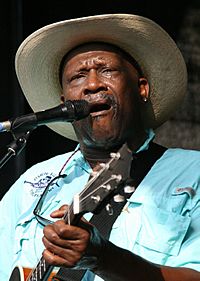
Because his father was a musician, other musicians from the Caribbean, Africa, and the US often visited their home. His father was even called "The Genius" by the famous singer Ella Fitzgerald. Henry Jr. became very interested in African music and studied it closely. His parents encouraged him to play music, starting him with classical piano lessons. He also learned the clarinet, trombone, and harmonica.
When Henry Jr. was eleven, his father died in an accident at his construction job. This was a very sad time for him. Later, his mother remarried, and his stepfather owned a guitar. Henry Jr. started playing it around age 13 or 14. His first guitar lessons came from a new neighbor, Lynwood Perry, who was the nephew of the famous bluesman Arthur "Big Boy" Crudup. In high school, Henry Jr. sang in a doo-wop group.
For a while, Henry thought about becoming a farmer instead of a musician. He started working on a dairy farm in Palmer, Massachusetts, at age 16. By 19, he was the farm foreman. He believes it's important to grow your own food. He often performs at Farm Aid concerts to support family farms.
Henry chose his stage name, Taj Mahal, because of dreams he had about Mahatma Gandhi, India, and being kind to everyone. He started using the name around 1959 or 1961, when he began attending the University of Massachusetts. Even though he studied farming in college, he decided to follow his passion for music. In college, he led a rhythm and blues band called Taj Mahal & The Elektras.
Music Career Highlights
In 1964, Mahal moved to Santa Monica, California. There, he formed a band called Rising Sons with Ry Cooder. They soon got a record deal with Columbia Records. After Rising Sons broke up, Jesse Ed Davis joined Taj Mahal and played on his first four solo albums. Their band was one of the first to have both Black and white members, which was unusual at the time.
Taj Mahal continued his solo career with Columbia Records. He released his first albums, Taj Mahal and The Natch'l Blues, in 1968. His song "Statesboro Blues" became very popular and helped his career take off. He also worked with famous musicians like Howlin' Wolf and Muddy Waters. He even performed with the Rolling Stones in the film The Rolling Stones Rock and Roll Circus in 1968.
Throughout the 1970s, Taj Mahal released many albums. He started adding sounds from the Caribbean and reggae music to his blues style. In 1972, he acted in the movie Sounder and wrote its music. He also worked on the sequel, Part 2, Sounder.
After leaving Columbia in 1976, he signed with Warner Bros. Records. He recorded three albums for them, including the music for the 1977 film Brothers. Later, it was hard for him to find another record deal because heavy metal and disco music were very popular.
In 1981, he moved to [[Kauaʻi, Hawaii]] and started the Hula Blues Band. This band began as friends playing music for fun, but soon they were performing and touring regularly. He recorded the album Taj in 1988, which helped him make a comeback.
In the 1990s, Mahal supported the Music Maker Relief Foundation, which helps older musicians. He also released albums that mixed blues with pop, R&B, and rock. He worked with artists like Eric Clapton and Etta James. In 1995, he recorded Mumtaz Mahal, which blended American blues with Indian instruments.
Taj Mahal won his first Grammy Award in 1997 for Señor Blues. He won another Grammy in 2000 for Shoutin' in Key. He also sang the theme song for the children's TV show Peep and the Big Wide World, which started in 2004.
In 2017, Mahal released a joint album called TajMo with Keb' Mo'. This album featured guest artists like Bonnie Raitt and Joe Walsh. In June 2017, he appeared in the documentary film The American Epic Sessions. He recorded a song using an old 1920s recording system. He also appeared in the TV series American Epic, talking about the early blues artists who influenced him.
Personal Life
Taj Mahal's first marriage was to Anna de Leon. They have a daughter, Aya de Leon, who is a novelist and professor. Taj Mahal married Inshirah Geter on January 23, 1976. They have six children together. His daughter Deva Mahal is also a musician.
Musical Style and Influences
Taj Mahal has a unique way of playing guitar, using his thumb and middle finger for fingerpicking. He also uses a flatpick for blues leads. Early in his career, he studied the styles of many blues singers, including Jimmy Reed, Son House, and Howlin' Wolf. He learned a lot by spending time at music clubs like Club 47 and Ash Grove.
His studies at the University of Massachusetts Amherst helped him learn about folk music from the Caribbean and West Africa. Over time, he added more and more African roots music to his sound. He blended elements of reggae, calypso, jazz, zydeco, R&B, gospel music, and country blues. These styles all helped create his special sound. Many people say Taj Mahal was one of the first major artists to explore world music.
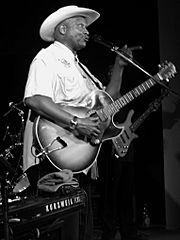
Author David Evans describes Mahal's voice as "extraordinary," ranging from rough and strong to smooth and gentle. Taj Mahal believes his 1999 album Kulanjan, made with kora master Toumani Diabaté from Mali, brought his musical journey full circle. He felt it helped him reconnect with his African heritage, like coming home.
Taj Mahal enjoys performing outdoors because he feels his music is meant for people to dance. He has said that he plays for "the goddess of music" and knows "she's dancing."
Awards and Recognition
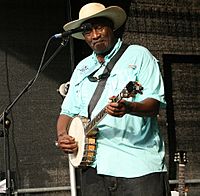
Taj Mahal has won five Grammy Awards and has been nominated seventeen times.
- 1997: Grammy Award for Best Contemporary Blues Album for Señor Blues
- 2000: Grammy Award for Best Contemporary Blues Album for Shoutin' in Key
- 2006: Blues Music Award for Historical Album of the Year for The Essential Taj Mahal
- 2018: Grammy Award for Best Contemporary Blues Album for TajMo
- 2022: Grammy Award for Best Traditional Blues Album for Get on Board
On February 8, 2006, Taj Mahal was named the official Blues Artist of the Commonwealth of Massachusetts. In March 2006, he and his sister, Carole Fredericks, received an award for promoting foreign languages through music. In 2011, he received an honorary degree from Wofford College. In 2014, he received a Lifetime Achievement award from the Americana Music Association.
The Recording Academy announced that Taj Mahal will receive a Lifetime Achievement Award in 2025 for his amazing contributions to music.
Discography
Taj Mahal has released many albums throughout his career. Here are some of his notable works:
Studio Albums
- 1968 – Taj Mahal
- 1968 – The Natch'l Blues
- 1969 – Giant Step/De Ole Folks at Home
- 1972 – Sounder (original soundtrack)
- 1974 – Mo' Roots
- 1977 – Brothers
- 1988 – Shake Sugaree – Taj Mahal Sings and Plays for Children
- 1995 – Mumtaz Mahal
- 1997 – Señor Blues
- 1999 – Kulanjan (with Toumani Diabaté)
- 2008 – Maestro
- 2017 – TajMo (with Keb' Mo')
Live Albums
- 1971 – The Real Thing
- 2000 – Taj Mahal and The Phantom Blues Band Live – Shoutin' in Key
- 2024 – Swingin' Live at the Church in Tulsa
Film and TV Appearances
Taj Mahal has appeared in several movies and TV shows, often as himself or as a musician.
Movies
- 1972 – Sounder as Ike Phillips
- 1976 – Part 2, Sounder as Ike Phillips
- 1991 – Bill & Ted's Bogus Journey as Gatekeeper
- 1996 – The Rolling Stones Rock and Roll Circus as himself
- 2017 – American Epic as himself
TV Shows
- 1977 – Saturday Night Live – Musical Guest
- 2003 – Arthur – as himself (voice)
- 2004 – Theme song from Peep and the Big Wide World
See also
 In Spanish: Taj Mahal (músico) para niños
In Spanish: Taj Mahal (músico) para niños


